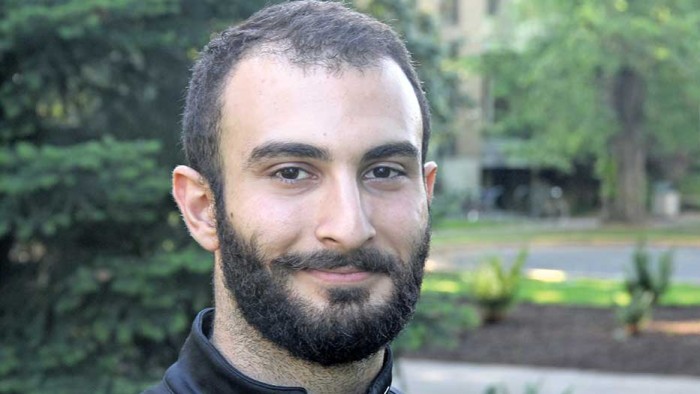 Social Sciences
Social Sciences
For Recent Graduate, Research Mission Accomplished

In May 2003, President George W. Bush stood at a podium on board the USS Abraham Lincoln and declared an end to major fighting in Iraq under a banner with the now-infamous words: “Mission accomplished.”
Less than three years later, the country collapsed in chaos. Civil war erupted in February 2006 and 14,000 Iraqis died in the first six months of that year; indeed, more than 96 percent of casualties suffered by the US-led coalition occurred after Bush’s declaration, as a ferocious insurgency fought the occupation.
For Neema Sahebi (above), the evidence is clear: The United States failed to stabilize Iraq due to poor planning and simultaneously alienating the Iraqi people.
It is not a verdict that he arrived at lightly. Rather, it is the culmination of painstaking research, long weekends spent poring over piles of books and a half-dozen at-times tense interviews with those closest to the truth: US veterans.
Seeking to graduate with honors in history (which he did successfully, last spring), Sahebi originally planned to write a thesis based solely on how U.S. cultural insensitivity contributed to the meltdown in Iraq. But senior instructor Alex Dracobly delivered fateful advice: “Don’t be afraid to allow your research to take you where it needs to take you.”
For a self-described “war nerd” who regularly engages in Civil War reenactments, it was all Sahebi needed to hear. He planted himself at the UO Knight Library, scrutinizing stacks of texts that included military interviews and memoirs from top brass and former members of the Bush administration; Sahebi estimates that his 50-plus page assessment of the Iraq War is based on no fewer than twenty-five books, many of which he read cover to cover.
Frustration, pride and service
Equally important to Sahebi was the opinion of US veterans—although the notion of interviewing them about failures in Iraq caused him no small amount of nervousness.
Working through Dracobly, Sahebi identified and interviewed five veterans of the war; he met with them individually at restaurants and bars, armed with a recorder, for wide-ranging, open-ended discussions that ran as long as an hour-and-a-half. Some of the veterans spoke with pride about the military’s effort in Iraq, others with obscenity-laced frustration. All of them, Sahebi said, warmed up to his willingness to keep an open mind.
“I would ask one question and then just put it aside—I wanted to talk to the guy,” Sahebi said. “I think they realized I’m looking for facts and my opinion will come at the very end.”
The project pushed Sahebi to the brink. Every conversation with Dracobly introduced a new idea to explore or another book to check out. Each full day of classes ended with the daunting proposition of reading up on the Iraq War well into the night. Sahebi learned to pace himself, taking an occasional day off from his research and reminding himself that the work—while demanding—was on a topic that he nevertheless found fascinating.
The result is an unvarnished criticism of the US administration and military, but an unapologetic Sahebi stresses that his report is not an attack on either body. When you look at the “cold, hard facts,” he says, it’s hard to arrive at any other conclusion.
Friends are reading Sahebi’s report and a possible employer—a maker of war-based video games—interviewed him for a position as a consultant. And Sahebi himself has come to appreciate the power of discovery—wherever it takes him.
“I had no idea I was going to be researching the things that I’m talking about right now,” he said. “When I think about where this started, I think, ‘How the hell did that happen?’”
—Matt Cooper
Photo: Matt Cooper


 Twitter
Twitter Facebook
Facebook Forward
Forward